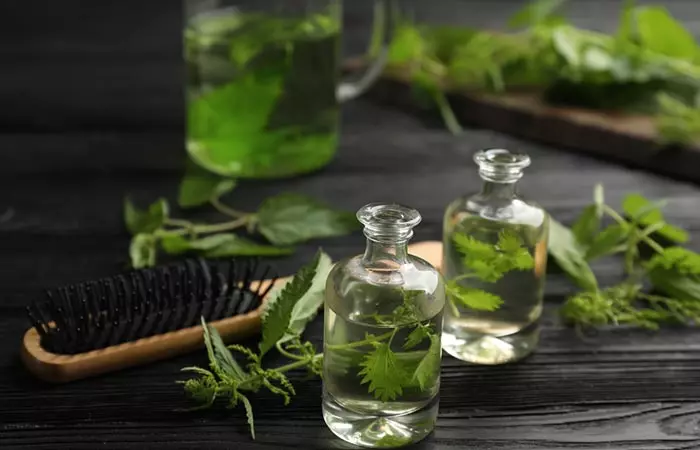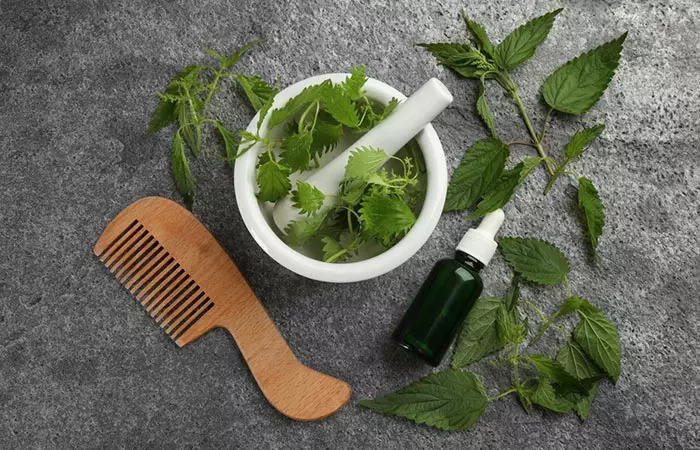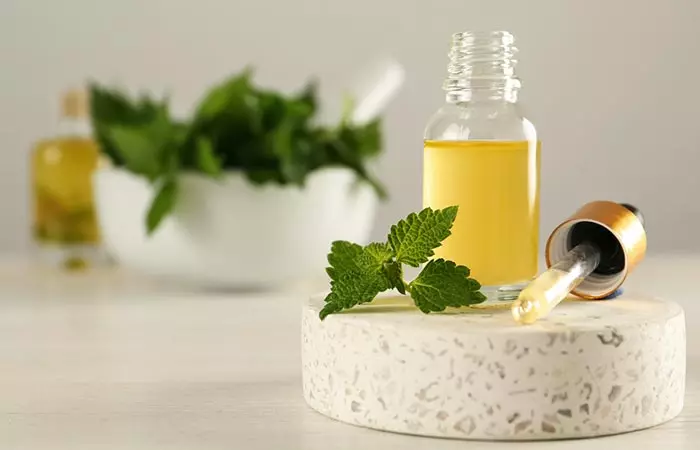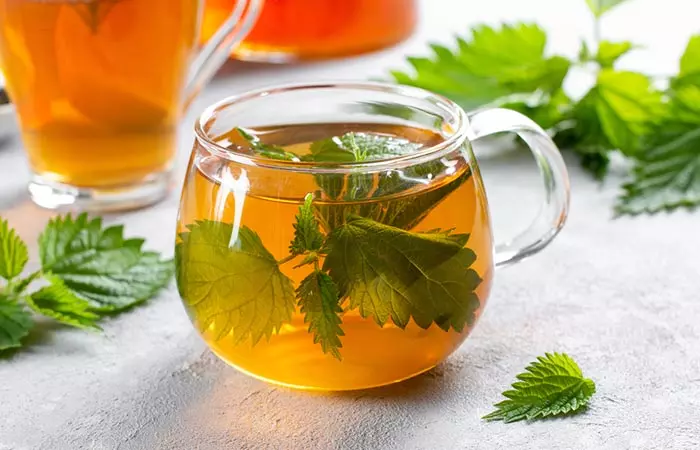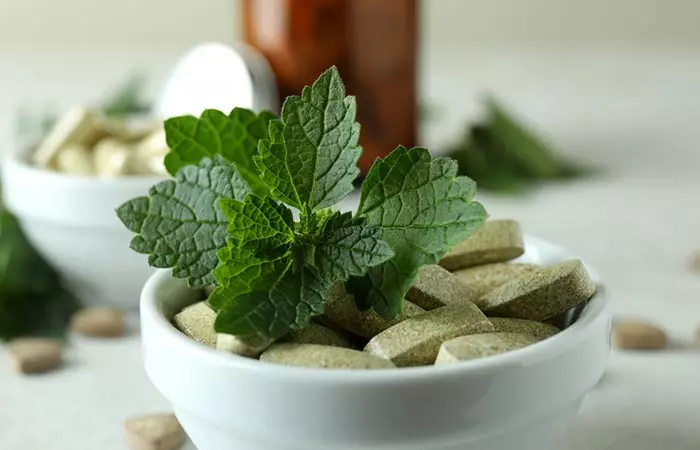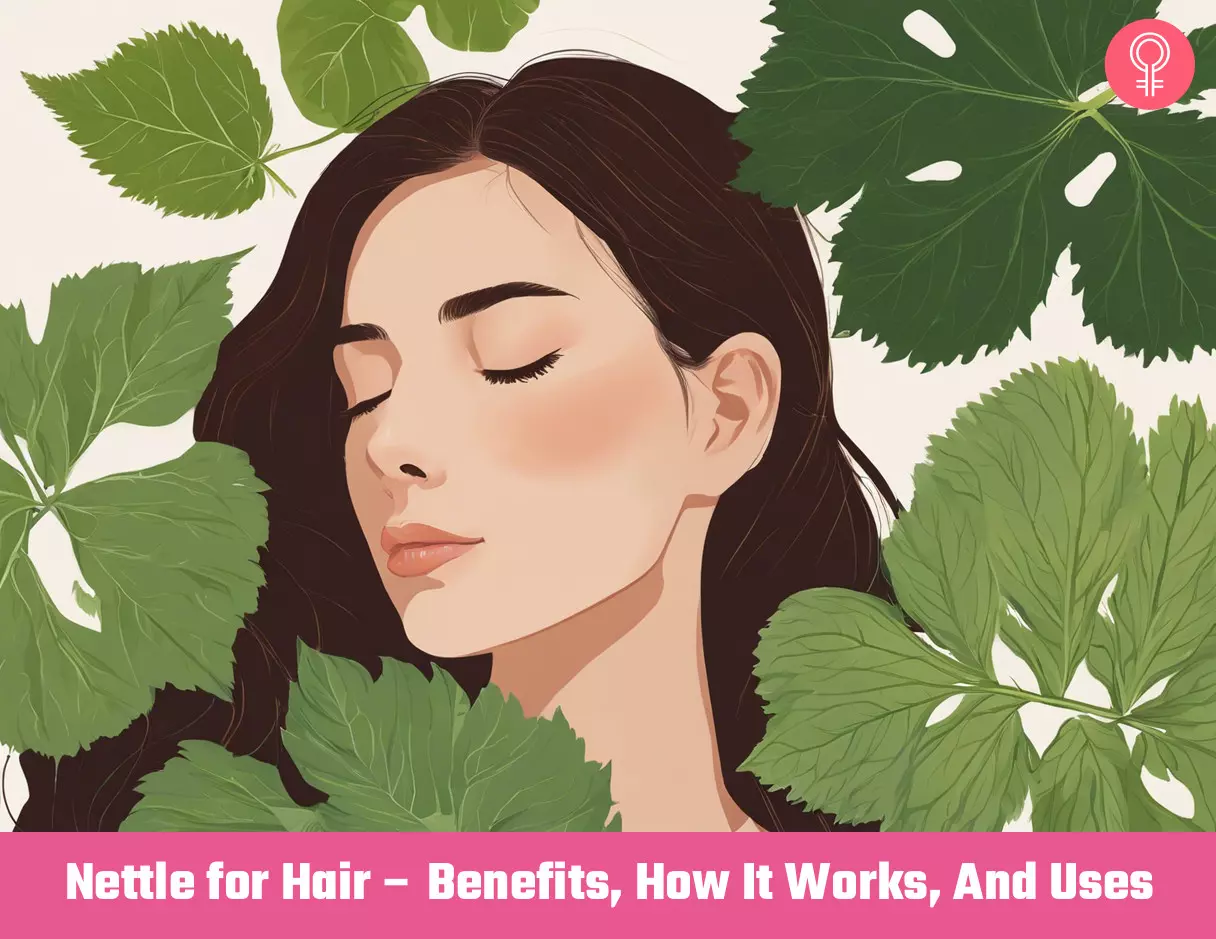What Is Stinging Nettle?
Stinging nettle (Urtica dioica) is a non-woody plant and weed commonly found in parts of America and Europe. It is infamous for the bristly hairs on its leaves and stalks. These fine hairs sting when rubbed against the skin. They cause an acute burning sensation and a temporary rash (1). What Are Its Benefits? It helps treat scalp inflammation and infections reduce hair fall and manage dandruff. Who Can Use It? While it is safe to be used on all hair types, those with skin conditions like eczema or dandruff might find it really beneficial. How Often? You can apply nettle oil regularly and consult with your doctor before taking any supplements. Caution Avoid using or consuming nettle if you’re pregnant or experience any skin irritation or diarrhea.
The stinging hairs are designed to act as a natural defense mechanism to ward off insects and pests. However, nettle leaves are rich in several biologically-active compounds, vitamins, and minerals like iron and sulfur (1). Along with the leaves, nettle flowers also contain potent antioxidants (1). Despite being classified as a weed, these potent biochemicals make stinging nettle a therapeutic and cosmeceuticali Amalgamation of ‘cosmetics’ and ‘pharmaceuticals’ indicating a cosmetic product with possible medicinal benefits. herb.
What Are The Benefits Of Nettle For Hair?
When used the right way, stinging nettle can be a great nourisher, particularly for hair and skin.
Anti-inflammatory Effects: The active biomolecules have potent anti-inflammatory properties that help in the treatment of skin and scalp conditions like eczema (1).
Controls Hair Loss And Baldness: Nettle extracts prevent hair loss by controlling and maintaining a clean scalp (1). Nettle may also strengthen hair anchorage by clearing clogged cuticles, thus preventing baldness. However, there is no scientific evidence to prove the same.
Antimicrobial Effects: Nettle leaves and flowers have shown antimicrobial effects against bacteria and fungi like coli and Candida albicans (1). So, you can use this herbal extract to manage scalp infections often caused by such microbes in humid conditions.
Heals Bleeding Wounds: Turkish ancient medicine uses a combination of thyme, licorice, common grape, and nettle to stop bleeding and blood loss (1). This may also effectively heal painful bleeding wounds and scabs on the scalp too.
Manages Dandruff: Massaging nettle oil into the scalp or using a shampoo containing nettle is said to control dandruff and flaking on the scalp (2).
Now that you know all about the benefits of nettle for your hair, find out how to use this natural remedy in the next section.
How To Use Nettle For Hair DIY Methods
1. Nettle Extract Salve
This salve uses nettle leaves and seeds that are rich in nutrients and polyphenolsi A family of naturally occurring organic compounds mainly found in fruits, vegetables, teas, and spices. . These active molecules nourish the scalp and strengthen the hair fibers. Applying this salve may help prevent baldness and dandruff. You Will Need
Dried nettle seeds Surgical spirit (alcohol/ethanol): enough to cover the seeds Nettle herb: 1 part Olive oil: 3 parts Muslin cloth or sieve Rosemary or lavender essential oils (optional) Glass bowls or mixing bowls (small or medium-sized)
What To Do
2. DIY Herbal Rinse
This nettle-based hair rinse uses herbs like rosemary, sage, and lavender. Rosemary leaves and lavender flowers improve the hair count and control hair loss and alopecia (3), (4). Sage has a characteristic camphor scent and potent anti-inflammatory effects, both of which may be beneficial for your hair and scalp (5). You Will Need
Nettle dried leaves: 10 teaspoons Dried lavender flowers: 7 teaspoons Dried sage herb: 6 teaspoons Rosemary herb: 5 teaspoons Filtered water: 2 cups Mixing bowl (medium-sized) Saucepan Amber bottle (small/medium)
What To Do
3. Rosemary-Nettle Anti-Dandruff Rinse
Rosemary extracts can easily penetrate the scalp to treat dry scalp and dandruff (6). A herbal hair rinse made by combining rosemary with apple cider vinegar and nettle is said to effectively maintain hair and scalp health. Try out its recipe given below. You Will Need
Nettle dried leaves: 1 tablespoon Rosemary dried leaves: 1 tablespoon Apple cider vinegar (ACV): 2 tablespoons Filtered water: 2 cups Glass or ceramic pot with lid
What To Do
Other Ways To Use Nettle For Hair Health
Stinging nettle leaves are not limited to external use and topical application. They retain their nutrients even when cooked or boiled. Some Native American tribes eat nettle as the first green food of the season (7). Here are a few common ways to use this herb for hair growth. However, note that not all of them have supporting scientific evidence.
Nettle Oil: Add a few nettle leaves (fresh or dried) to a container with olive oil. Let it infuse for about a month. Massage the oil into your scalp regularly before washing your hair. The active molecules in this oil infusion may help in hair loss prevention.
Nettle Tea: Boil a spoonful of dried nettle leaves in 2-3 cups of filtered water. Let it steep for 4-5 minutes. Strain and serve the tea warm or cold.
Nettle Shoots And Roots: Blanch or boil tender nettle shoots and roots. Sprinkle some salt and pepper on them. Add a dollop of butter and combine well. This can be a nutrient-dense side-dish or salad as the toxic chemicals in nettle are deactivated during the cooking process (8).
Nettle Supplements:
Not a fan of nettle leaves? Try nettle supplements. These herbal supplements come in the form of capsules or tablets that retain all the nutrients of fresh nettle. No more fear of stings, rashes, or irritation! There are many other options to get your share of nettle nutrients. However, you should be cautious in choosing which ones you use and when and how you use them. The active molecules of this powerful weed could trigger side effects.
Does Stinging Nettle Have Risks And Side Effects?
Although there are many stinging nettle benefits, overuse and overconsumption can cause several problems. Read on to learn about the side effects.
Not using proper equipment while harvesting or handling nettle can cause severe rashes and irritation. Pregnant and lactating women are advised against using nettle. It may induce abortion and uterine contractions (7). Nettle juice may cause diarrhea and gastrointestinal complaintsi Issues or disorders related to the stomach and intestine, including heartburn, constipation, bloating, and irritable bowel syndrome. (7). If you are on blood thinners, diureticsi Water pills that help remove water from the body through the kidneys and increase the production of urine. , blood pressure, or diabetes medication, consult your doctor before using nettle products.
Does nettle tea block DHT? Yes. Nettle has the potential to block DHT (dihydrotestosterone), i.e., the hormone responsible for hair loss and thinning hair. Nettle extracts inhibit the enzyme called 5-alpha-reductase, which converts testosterone to DHT, thus blocking its production. How do you make nettle spray for hair? Boil a cup of fresh nettle leaves in a cooking pot for 10-20 minutes. Strain out the leaves and let the water cool down. Add about 2 tablespoons of apple cider vinegar to the water and store it in the fridge. Pour the water into a spray bottle and spray your hair and scalp with it after shampooing. Can you leave nettle in your hair? While nettle is beneficial for hair growth, to avoid any residue or buildup it’s essential to rinse the hair properly and not leave it for longer periods of time. Is nettle cooling or heating? Nettle is a cooling herb for hair as it is known for its anti-inflammatory properties and is often used to soothe and calm the scalp. Nettle helps to reduce itching and inflammation on the scalp and also helps those with dandruff. Does nettle help with oily hair? Yes, nettle helps with oily hair due to its astringent properties which control excess oil production on the scalp. How long does it take to see results from using nettle for hair health? There is no specific timeline, however, it depends on the severity of the condition, the frequency of use, and the method. Some may notice an improvement in their hair health after just a few uses of nettle, while others may need to use it regularly for several weeks or months to see significant results. Can nettle be used for all hair types? Yes, nettle be used for all hair types.
Illustration: Nettle for Hair – Benefits How It Works And Uses
